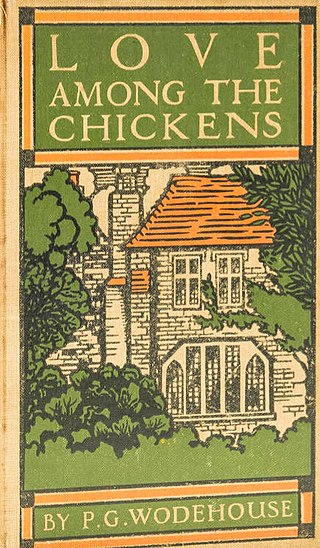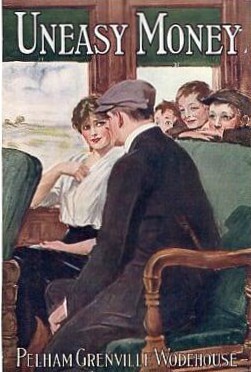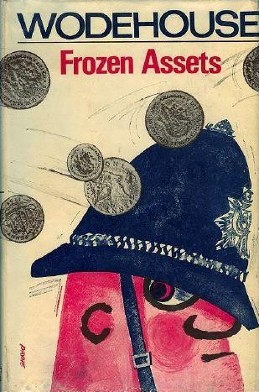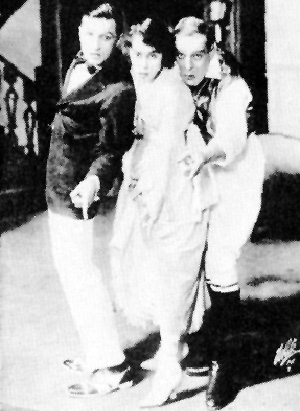
Ring for Jeeves is a novel by P. G. Wodehouse, first published in the United Kingdom on 22 April 1953 by Herbert Jenkins, London and in the United States on 15 April 1954 by Simon & Schuster, New York, under the title The Return of Jeeves.

Nothing Serious is a collection of ten short stories by P. G. Wodehouse. It was first published in the United Kingdom on 21 July 1950 by Herbert Jenkins, London, and in the United States on 24 May 1951 by Doubleday & Co., New York. It was published again in 2008 by The Overlook Press.

A Few Quick Ones is a collection of ten short stories by P. G. Wodehouse. It was first published in the United States on 13 April 1959 by Simon & Schuster, New York, and in the United Kingdom on 26 June 1959 by Herbert Jenkins, London. The first US edition dust jacket was designed by Paul Bacon. The book's title comes from the informal phrase "a quick one", which is British slang for an alcoholic drink consumed quickly.

Love Among the Chickens is a novel by P. G. Wodehouse, first published as a book in the United Kingdom in June 1906 by George Newnes, London, and in the United States by Circle Publishing, New York, on 11 May 1909. It had already appeared there as a serial in Circle magazine between September 1908 and March 1909. The English edition was dedicated "to Sir Bargrave and Lady Deane"; the Rt Hon Sir Henry Bargrave Deane QC was a High Court judge and a cousin of Wodehouse's mother.

The Man Upstairs is a collection of short stories by P. G. Wodehouse, first published in the United Kingdom on 23 January 1914 by Methuen & Co., London. Most of the stories had previously appeared in magazines, generally Strand Magazine in the UK and Cosmopolitan or Collier's Weekly in the United States. Although the book was not published in the US, many of the stories were eventually made available to US readers in The Uncollected Wodehouse (1976) and The Swoop! and Other Stories (1979).

The Heart of a Goof is a collection of nine short stories by English comic writer P. G. Wodehouse. It was first published in the United Kingdom on April 15, 1926, by Herbert Jenkins, and in the United States on March 4, 1927, by George H. Doran, New York, under the title Divots. The stories were originally published in magazines between 1921 and 1926.

Uneasy Money is a novel by P. G. Wodehouse, first published in the United States on 17 March 1916 by D. Appleton & Company, New York, and in the United Kingdom on 4 October 1917 by Methuen & Co., London. The story had earlier been serialised in the U.S in the Saturday Evening Post from December 1915, and in the UK in the Strand Magazine starting December 1916.

Doctor Sally is a short novel by P. G. Wodehouse, first published in the United Kingdom on 7 April 1932 by Methuen & Co., London. In the United States, it was serialised in Collier's Weekly from 4 July to 1 August 1931 under the title The Medicine Girl, and was included under that name in the US collection The Crime Wave at Blandings (1937).

Quick Service is a novel by P. G. Wodehouse, first published in the United Kingdom on 4 October 1940 by Herbert Jenkins, London and in the United States on 27 December 1940 by Doubleday, Doran, New York.

Money in the Bank is a novel by P. G. Wodehouse, first published in the United States on 9 January 1942 by Doubleday, Doran, New York, and in the United Kingdom on 27 May 1946 by Herbert Jenkins, London. UK publication was delayed while Wodehouse was under suspicion of collaboration during the Second World War. The book was published in English in Germany in August 1949 by Tauchnitz.

The Old Reliable is a novel by P. G. Wodehouse, first published in the United Kingdom on 18 April 1951 by Herbert Jenkins, London and in the United States on 11 October 1951 by Doubleday & Co, New York. The novel was serialised in Collier's magazine from 24 June to 22 July 1950, under the title Phipps to the Rescue.

Barmy in Wonderland is a novel by P. G. Wodehouse, first published in the United Kingdom on 21 April 1952 by Herbert Jenkins, London, and in the United States on 8 May 1952 by Doubleday & Company, New York, under the title Angel Cake. The novel may be considered part of the expanded Drones Club canon, since the main character Barmy Fotheringay-Phipps is a member of the club.

Something Fishy is a novel by P. G. Wodehouse, first published in the United Kingdom on 18 January 1957 by Herbert Jenkins, London and in the United States on 28 January 1957 by Simon & Schuster, Inc., New York, under the title The Butler Did It.

Frozen Assets is a novel by P. G. Wodehouse, first published in the United States on 14 July 1964 by Simon & Schuster, Inc., New York under the title Biffen's Millions, and in the United Kingdom on 14 August 1964 by Herbert Jenkins, London.

Company For Henry is a novel by P. G. Wodehouse, first published in the United States on 12 May 1967 by Simon & Schuster, Inc., New York, under the title The Purloined Paperweight, and in the United Kingdom on 26 October 1967 by Barrie & Jenkins, London.

Bachelors Anonymous is a novel by P. G. Wodehouse, first published in the United Kingdom on 15 October 1973 by Barrie & Jenkins, London and in the United States on 28 August 1974 by Simon & Schuster, Inc., New York.

Oh, Boy! is a musical in two acts, with music by Jerome Kern and book and lyrics by Guy Bolton and P. G. Wodehouse. The story concerns befuddled George, who elopes with Lou Ellen, the daughter of Judge Carter. He must win over her parents and his Quaker aunt. His dapper polo champion friend Jim is in love with madcap actress Jackie, but George must hide her while she extricates herself from a scrape with a bumbling constable whom she punched at a party raid.
"Jeeves and the Greasy Bird" is a short story by English humorist P. G. Wodehouse, and features the young gentleman Bertie Wooster and his valet Jeeves. The story was published in Playboy magazine in the United States in December 1965, and in Argosy magazine in the United Kingdom in January 1967. The story was also included in the 1966 collection Plum Pie.
"Indian Summer of an Uncle" is a short story by P. G. Wodehouse, and features the young gentleman Bertie Wooster and his valet Jeeves. The story was published in The Strand Magazine in the United Kingdom in March 1930, and in Cosmopolitan in the United States that same month. The story was also included as the tenth story in the 1930 collection Very Good, Jeeves.

















